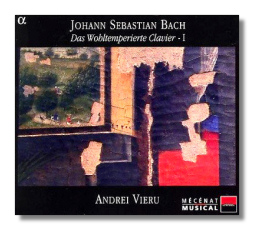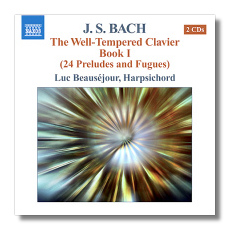
The Internet's Premier Classical Music Source
Related Links
- J.S. Bach Reviews
- Latest Reviews
- More Reviews
-
By Composer
-
Collections
DVD & Blu-ray
Books
Concert Reviews
Articles/Interviews
Software
Audio
Search Amazon
Recommended Links
Site News
 CD Review
CD Review
Johann Sebastian Bach
Well-Tempered Clavier Book 1, BWV 846-869 (1722)

Andrei Vieru, piano
Recorded Chapelle de l'hopital Notre-Dame de Bon Secours, Paris, Summer 2005; Released April 2006
Alpha Productions 87 2CDs 138:49


Luc Beausejour, harpsichord
Recorded St. John Chrysostom Church, Newmarket, Ontario, July/October 2005; Released March 2007
Naxos 8.557625-26 2CDs 111:21
Even setting aside the matter of harpsichord vs. piano, these two sets of Bach's Well-Tempered Clavier Book 1 are as different as "day and night". Beausejour employs quick tempos; Vieru takes his sweet time. Beausejour is the epitome of "mainstream", while Vieru's readings are distinctive and thought-provoking. Beausejour uses a very limited range of color and texture; Vieru is quite expansive in these areas, creating a more interesting and fresh approach to Bach's music. Concerning matters of rhythmic hesitations and staggering of musical lines, Beausejour avoids them; Vieru uses these techniques to advance his musical arguments and deepen the emotional palette. Speaking of emotional content, Beausejour prefers a Bach of moderation, a notion that doesn't hold much validity with me. I am also not impressed with Beausejour's avoidance of incisive inflections and the floating of a note. Lastly, Vieru's performances have an improvisatory feel to them, while Beausejour's sound mechanical in comparison.
I'm being rather hard on Luc Beausejour, but the worst is yet to come – harpsichord sound. It is thin with a very weak bass response, a condition that worsens the musical dialogue. Playing around with the audio controls and my trusty equalizer helps a little, but I find the results not really worth the effort. Oddly enough, the liner notes report that the harpsichord Beausejour plays was built in 1985 to achieve "the sound ideal" for Bach's keyboard music. From the sound on the recording, I think that the builders (Rejean Poirier and Yves Beaupre) might want to go back to the drawing board.
So although Beausejour's performances are thoroughly professional and quite enjoyable, they take a back-seat to the exceptional harpsichord sets from Gustav Leonhardt, Helmut Walcha, Blandine Verlet, Edward Parmentier, Kenneth Gilbert, Wanda Landowska, Masaaki Suzuki and Glen Wilson. With competition at such a high level, Beausejour's version only has viability for those on a very tight Naxos budget.
Moving from Luc Beausejour to Andrei Vieru is a most advantageous decision. The music now takes on an organic quality with an abundant sense of improvisation, freshness, deep thought, illumination of the architecture and a deep-rooted love of the full range of Bach's musical personality. Any reservations I have read from other reviews center around the premise that Vieru makes too much use of the pedals, but my view is that his performances are delightfully lush. Of course, a lush sound can damage the clarity of musical detail, but Vieru amazingly offers highly detailed readings that refine Bach's contrapuntal lines. At the same time, there is a noteworthy sensual element to the performances that I have not noticed in other versions of the Well-Tempered Clavier.
Don's Conclusions: Although not one of the more exciting Well-Tempered Claviers on the market, Vieru's set has a host of compelling features that makes it among the top echelon of recordings. Beausejour's mainstream and not very interesting readings pale next to Vieru's and are not recommended. I expected better from Beausejour, but Vieru has more than made up for my disappointment.
Copyright © 2007, Don Satz




















